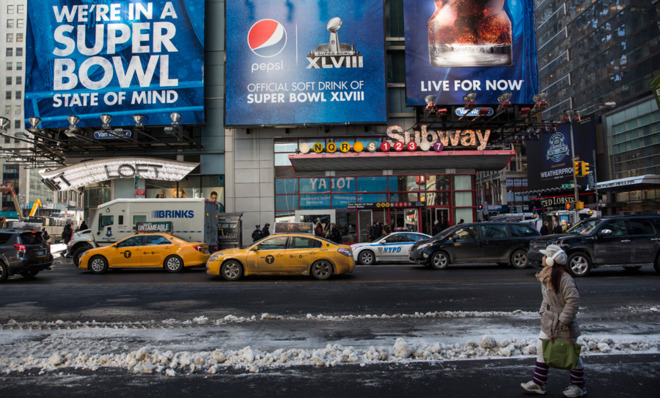Is the cold weather really causing Super Bowl ticket prices to fall?
Prices are plummeting ahead of the big game, which is set to be played in frigid temperatures


A free daily email with the biggest news stories of the day – and the best features from TheWeek.com
You are now subscribed
Your newsletter sign-up was successful
The forecast for Super Bowl XLVIII at MetLife Stadium in New Jersey — the NFL's first ever cold-weather, outdoor championship game — is chilling: A daytime high of 38 degrees, with a chance of rain and snow showers.
With the advent of the Polar Vortex and weeks of bone-cold temperatures in the Northeast, there had been concern that dismal weather conditions would dampen fan interest in attending the big game. And with ticket prices plummeting in recent days, many are pinning the blame squarely on the freezing forecast.
Intuitively, that makes sense. Sure, the Super Bowl is a huge draw, but not so much when you have to sit in freezing temperatures for hours, with a halftime show of Bruno Mars and the Red Hot Chili Peppers.
The Week
Escape your echo chamber. Get the facts behind the news, plus analysis from multiple perspectives.

Sign up for The Week's Free Newsletters
From our morning news briefing to a weekly Good News Newsletter, get the best of The Week delivered directly to your inbox.
From our morning news briefing to a weekly Good News Newsletter, get the best of The Week delivered directly to your inbox.
But while low temperatures are likely contributing to the downturn in ticket prices, they don't deserve all the blame. In fact, the ticket-price freak-out may be more myth than reality.
For one, tickets to this year's event started off far more expensive than previous Super Bowls. The most expensive seats have a face value of $2,600 — more than double the priciest tickets from last year, which went for $1,250. Tickets in lower tiers are also more expensive than in years past.
That's in part because of the inflationary effect of having the game in the New York-New Jersey area. (More money plus more demand equals higher prices.) But it's also an attempt by the league to winnow the margin between the face value and price-gouging in the secondary market.
The end result: The average ticket sale price so far is $3,715, according to Forbes, well above the average from the past two years. Meanwhile, ticket sales are up 33 percent overall compared to the same period last year.
A free daily email with the biggest news stories of the day – and the best features from TheWeek.com
Moreover, ticket prices typically taper off considerably right around this time every year. Even with the Patriots and Giants — both of whom boast large, rabid fan bases — facing off in 2012, ticket prices fell 20 percent before game day.
Ticket sales — and thus prices — generally spike immediately after the Conference Championships, which determine who will play in the Super Bowl. Understandably, many fans want to know which teams they'll be seeing before shelling out well over a grand for a single football game.
But as the game draws closer, sellers become more desperate to unload their tickets while they still can. And the remaining tickets tend to be less desirable than those that have already sold, further suppressing the average price.
The cold weather projected for this year has only exacerbated that trend. But the price drop doesn't strictly reflect the effects of the cold weather on fan enthusiasm; it is also a result of sellers expecting less demand and then freaking out.
"What we have now is like a panicked stock market," James Kimmel, who owns a Seattle ticket firm, tells ESPN. "The buyers have frozen, and the sellers are panicking."
In other words, all the hype about the weather may actually be leading sellers to preemptively lower their prices.
Funnily enough, if prices keep falling, you can bet tickets will start selling faster than ever as people rush to get in on the bargain — something that would then send prices right back up.
Jon Terbush is an associate editor at TheWeek.com covering politics, sports, and other things he finds interesting. He has previously written for Talking Points Memo, Raw Story, and Business Insider.
-
 The Week Unwrapped: Do the Freemasons have too much sway in the police force?
The Week Unwrapped: Do the Freemasons have too much sway in the police force?Podcast Plus, what does the growing popularity of prediction markets mean for the future? And why are UK film and TV workers struggling?
-
 Properties of the week: pretty thatched cottages
Properties of the week: pretty thatched cottagesThe Week Recommends Featuring homes in West Sussex, Dorset and Suffolk
-
 The week’s best photos
The week’s best photosIn Pictures An explosive meal, a carnival of joy, and more
